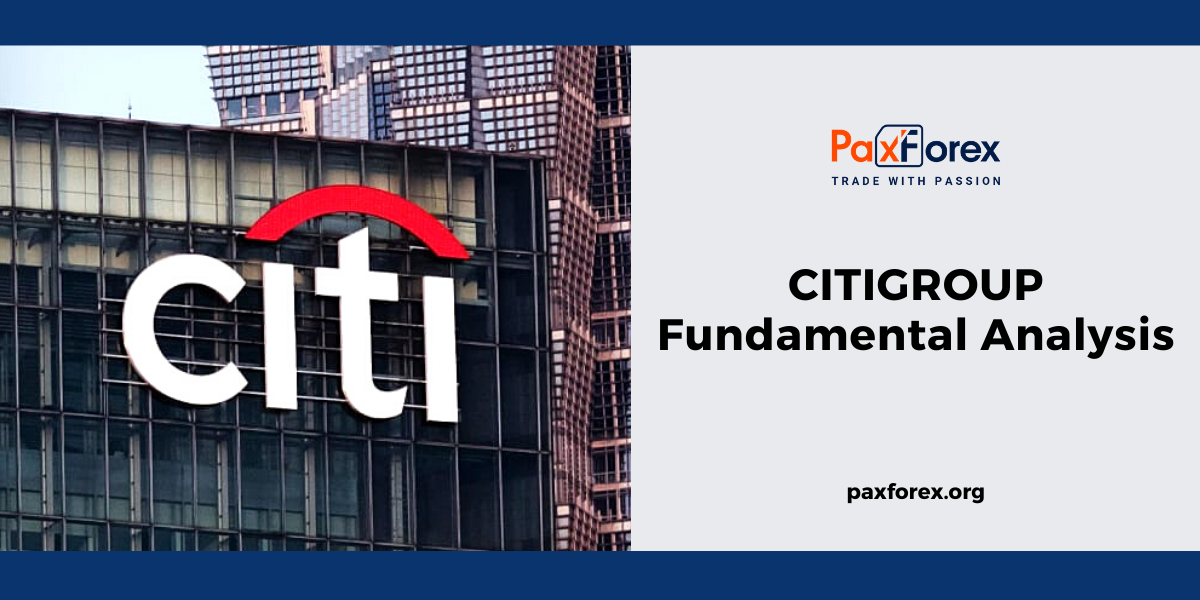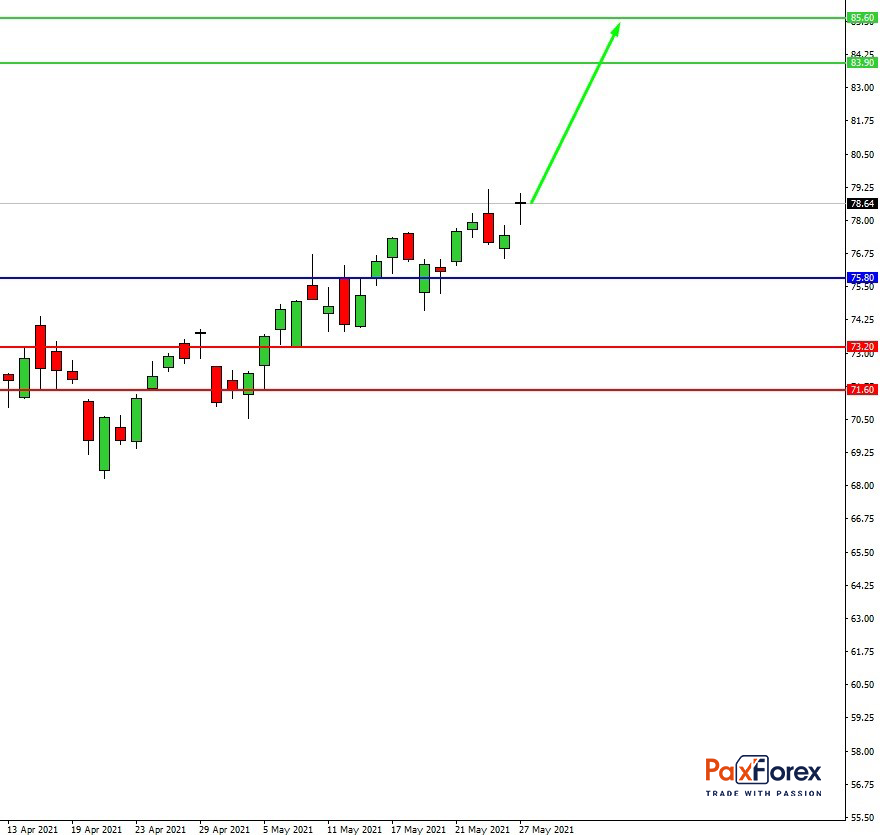
Source: PaxForex Premium Analytics Portal, Fundamental Insight
Last year was not an easy one for banks as they had to set aside billions of dollars to protect against potentially devastating credit losses due to the pandemic. However, thanks to quick action by the U.S. government and the Federal Reserve, the situation was not as bad as it could have been.
Citigroup managed to get into a series of problems with regulators that led to a much steeper decline in its value. After admitting its mistakes, the company revised its management team, and the new bosses adjusted the course in a way that restored investor confidence.
Citigroup runs a giant company. It serves retail customers through its consumer banking segment, which offers credit and deposit products, and institutional customers through its investment banking segment. The latter accounts for a much larger portion of the company's revenues, 63%, offering treasury and trading solutions, financial markets services, and private banking.
The bank's compliance and risk management practices drew the attention of U.S. regulators, who fined the company $400 million in late 2020. They pointed to "several long-standing deficiencies" throughout the company, including the way it treated consumers in insurance matters and the way it handled foreclosed homes.
Around the same time, Citi was hit with some smaller fines, including for financial market violations.
The fines were in addition to a major mistake the bank itself made when it accidentally wrote off several lenders - one of whom refused to pay them back - for $893 million. Citi was acting as a loan agent for cosmetics giant Revlon and should have made a small interest payment of $7.8 million on behalf of the company. Instead, Citi is now at a loss of up to $504 million, which the judge ruled is non-refundable.
But perhaps the biggest problem has been the low stock price, which has caused the company to trade well below book value throughout 2020, even as its peers have actively recovered, and from higher benchmark valuations. Constant regulatory strikes seemed to completely undermine investor confidence.
Amid this storm, then-CEO Michael Corbat announced his resignation, and his successor was the highly qualified Jane Fraser.
The company announced an additional $1 billion investment in compliance and risk management across the Citigroup enterprise. So far, there has been no further turmoil, and the stock has regained an important benchmark, trading above the $75.50 mark in the first quarter of 2021.
Citi's financial performance in the first quarter was mixed. The institutional segment saw 5% year-over-year (and 28% sequential) revenue growth, but the consumer segment saw a 14% year-over-year decline. The company noted that the reason for the decline in consumer segment revenue was higher credit card payments, as borrowers paid down debt and spent less money in an environment where some segments of the economy were still closed.
It came after Fraser, the new CEO, announced that Citi would stop providing consumer banking services in 13 markets in Asia and the Middle East, focusing instead on more efficient wealth management services. It's part of a broader business renewal to focus on the areas where it's performing well and cut those that aren't.
Citigroup also cites continued low-interest rates, which, as the minutes of last week's Federal Reserve meeting showed, could change. Fed members are concerned that the economy is growing too fast, inflation is rising, and that it may be time to discuss cutting back on ultra-soft monetary policy (such as quantitative easing - where the Fed "creates" about $120 billion a month to buy different types of debt instruments). Robert Kaplan, the powerful president of the Dallas Fed, officially stated last week that the policy rollback should start "sooner rather than later," a view echoed by the president of the Philadelphia Fed the next day.
If that happens, it should raise interest rates around the world and give banks like Citi the flexibility to adjust their net interest margins for greater profits.
Citigroup's first-quarter earnings were $3.62 per share on revenue of $19.3 billion. The company is performing well, but its stock has yet to catch up with its competitors.
While Citi's share price to book value ratio represents progress over the past 12 months (it has only been 0.6 times since then), the company still has a long way to go to catch up with other big banks like JPMorgan Chase, which is trading at 2.46. Bank of America, which is more consumer-oriented, trades at 2 times book value.
If Citi trades at ratios similar to those above, the stock price could more than double. But the company must avoid regulatory problems and tighten its operations to prevent mistakes that could have been prevented.
The company's stock was trading at $51 in September when Corbat announced his resignation. Since then, they have risen more than 50 percent, but it's worth noting that the entire financial sector experienced a strong rally during that period. Nonetheless, Citigroup's participation means a vote of confidence by investors in the decision to need new leadership, and the follow-up so far shows that operations are going well.

While the price is above 75.80, follow the recommendations below:
- Time frame: D1
- Recommendation: long position
- Entry point: 79.00
- Take Profit 1: 83.90
- Take Profit 2: 85.60
Alternative scenario:
If the level 75.80 is broken-down, follow the recommendations below:
- Time frame: D1
- Recommendation: short position
- Entry point: 75.80
- Take Profit 1: 73.20
- Take Profit 2: 71.60













